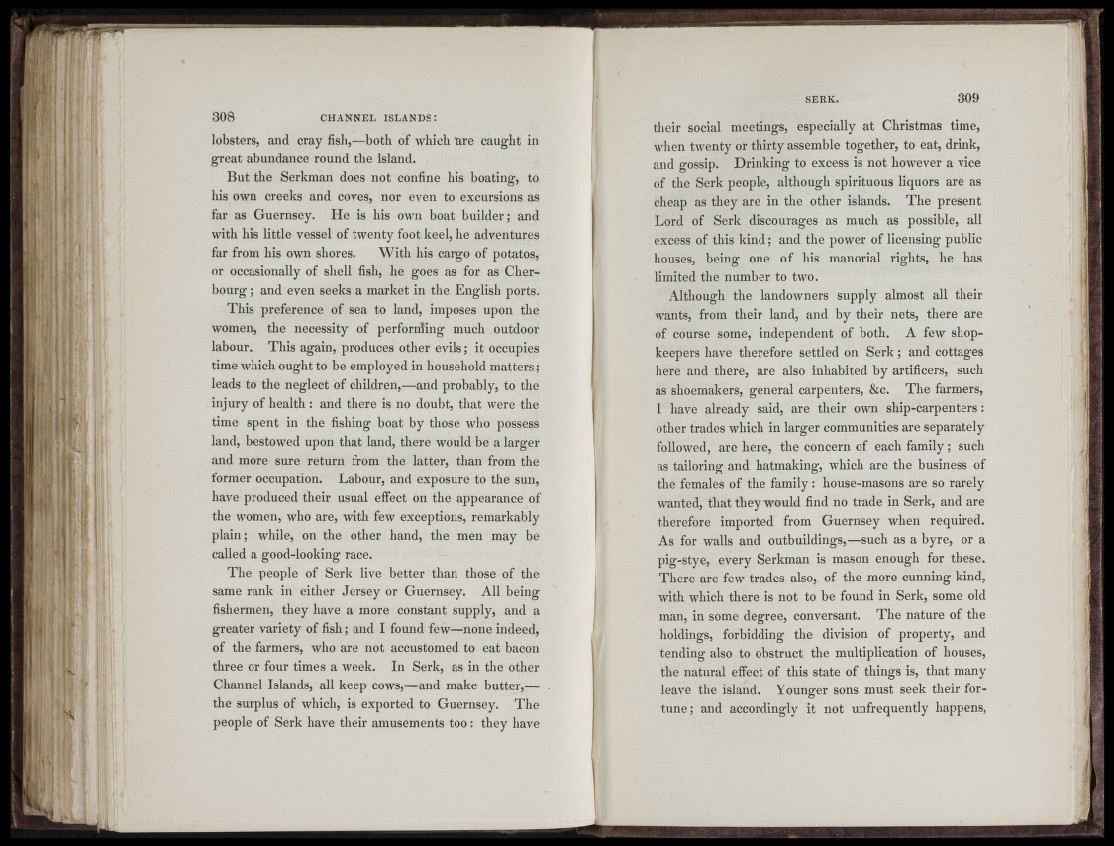
i ii
, i
(
Ir UUESI
^ i * A Ei
r Ei f ; :!
3 l y h i
A
308 CHANNEL i s l a n d s :
lobsters, and cray fish,—both of which Rre caught in
great abundance round the island.
But the Serkman does not confine his boating, to
his own creeks and coves, nor even to excursions as
far as Guernsey. He is his own boat builder; and
with his little vessel of twenty foot keel, he adventures
far from his own shores. With his cargo of potatos,
or occasionally of shell fish, he goes as for as Cherbourg
; and even seeks a market in the English ports.
This preference of sea to land, imposes upon the
women, the necessity of perforifiing much outdoor
labour. This again, produces other evils; it occupies
time which ought to be employed in household matters;
leads to the neglect of children,—and probably, to the
injury of health : and there is no doubt, that were the
time spent in the fishing boat by those who possess
land, bestowed upon that land, there would be a larger
and more sure return from the latter, than from the
former occupation. Labour, and exposure to the sun,
have produced their usual effect on the appearance of
the women, who are, with few exceptions, remarkably
plain; while, on the other hand, the men may be
called a good-looking race.
The people of Serk live better than those of the
same rank in either Jersey or Guernsey. All being
fishermen, they have a more constant supply, and a
greater variety of fish; and I found few—none indeed,
of the farmers, who are not accustomed to eat bacon
three or four times a week. In Serk, as in the other
Channel Islands, all keep cows,—and make butter,—
the surplus of which, is exported to Guernsey. The
people of Serk have their amusements to o : they have
their social meetings, especially at Christmas time,
when twenty or thirty assemble together, to eat, drink,
and gossip. Drinking to excess is not however a vice
of the Serk people, although spirituous liquors are as
cheap as they are in the other islands. The present
Lord of Serk discourages as much as possible, all
excess of this kind; and the power of licensing public
houses, being one of his manorial rights, he has
limited the number to two.
Although the landowners supply almost all their
wants, from their land, and by their nets, there are
of course some, independent of both. A few shopkeepers
have therefore settled on Serk ; and cottages
here and there, are also inhabited by artificers, such
as shoemakers, general carpenters, &c. The farmers,
I have already said, are their own ship-carpenters:
other trades which in larger communities are separately
followed, are here, the concern of each family; such
as tailoring and hatmaking, which are the business of
the females of the family: house-masons are so rarely
wanted, that they would find no trade in Serk, and are
therefore imported from Guernsey when required.
As for walls and outbuildings,—such as a byre, or a
pig-stye, every Serkman is mason enough for these.
There are few trades also, of the more cunning kind,
with which there is not to be found in Serk, some old
man, in some degree, conversant. The nature of the
holdings, forbidding the division of property, and
tending also to obstruct the multiplication of houses,
the natural effect of this state of things is, that many
leave the island. Younger sons must seek their fortune;
and accordingly it not unfrequently happens,
i , t